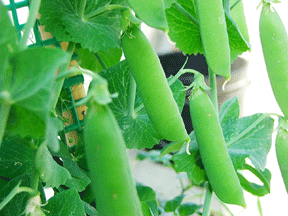
Volume XVII, Issue 34 # August 20 - August 26, 2009 |
 |
by Dr. Frank Gouin
Opportunity Knocks Twice
Late August begins a whole second gardening season
If your spring planting of peas drowned, as mine did, that means that you did not enjoy your traditional feast of fresh garden peas. According to tradition, peas, like potatoes, are to be planted on St. Patrick’s Day. I have never believed in that rule, and I plant my peas whenever the soil can be properly prepared, which is nearly always a week or so after St. Patrick’s day. This year I had a great crop of potatoes. But no peas.
So that I can enjoy my annual feast of fresh-picked peas and put peas in the freezer, I will be planting in the upcoming weeks. Peas perform at their best in cooler weather. Planted in mid- to late-August, the peas will be well established by the time cooler weather begins in September, when we start having cool nights with warm days.
Since peas germinate best in cool soils, you must keep the soil moist throughout germination. Allowing the soil to dry will result in erratic and most likely poor germination. Check the seeded area and water lightly nearly every day. A most soil is a cool soil.
While you are in the garden, you might as well sow more snap beans, beets, carrots, rutabaga, turnips, kale, collards, kohlrabi, spinach and lettuce. These are all good fall crops that not only provide healthy eating but also reduce the grocery bill.
August is also a great time to transplant cabbage, Brussels sprouts, cauliflower, broccoli and Chinese cabbage. If you like dill, consider sowing seeds in your garden. Instead of seeds, fall-sown dill produces an abundance of lush green foliage known as dill weed. Here in southern Maryland, dill can be harvested until almost Christmas.
Second chance on squash, too
Q We cannot seem to get more than one crop of squash, both zucchini and yellow, before the plants wither and die. We have gotten plants from Betty Knapp and also from Wal-Mart (Bonnie Plant Farms) and had the same result. We planted radishes among the squash on advice and the radishes did fine, but the squash died. I have used Sevin to kill borers but that does not seem to be the problem. Every other vegetable in the garden does fine. Years ago we had baseball bat-sized zucchini, but not any longer.
–Francis Boucher, Shady Side
A The squash borer has been very active this year. My zucchini produced heavily until late July, when the plant started dying back. I kept them producing by spraying the vines, not the leaves, weekly with Sevin. Direct the spray beneath the leaves and concentrate on spraying the vine. I missed two weeks, because of having to harvest peaches, and the borers killed my plant. I suggest that you do a late planting of zucchini because the borers do not seem to bother late plantings.